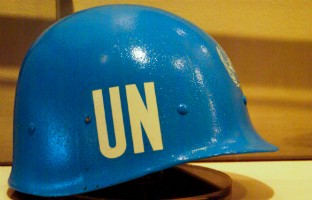Rwanda and after
This month marks the 20th anniversary of the genocide in Rwanda. By many measures, Rwanda has rebounded remarkably in the years since mass killings left 800,000 dead. Its economy is strong and its poverty rate has declined. The government has brought order to the country and overseen a process of reconciliation involving international, national, and village trials.
On the international scene, Rwanda is a synonym for doing nothing in the face of genocide. The current U.S. ambassador to the United Nations, Samantha Power, rose to prominence with an impassioned book lamenting world leaders’ failure to intervene in 1994. Bill Clinton, president at the time, has expressed regret about his inaction. New Zealand recently apologized for its failure to act.
Read our latest issue or browse back issues.
After 20 years—and now with someone like Power in a leadership role—is the international community any more likely to intervene when the next Rwanda looms? It’s doubtful. Humanitarian intervention sounds good in moral theory but is frequently set aside in the political reckoning.
The situation in the Central African Republic may offer a test case. Rivalry there between Christians and Muslims has erupted into mass killings, torture, and rape. Officials in France and at the United Nations have warned that full-scale ethnic cleansing might break out. The UN Security Council has decided to send a 12,000-member peacekeeping force to the CAR, but it won’t arrive until September. At present, a 2,000-strong French force has the nearly impossible task of keeping peace in a country the size of Texas. Will nations of the world intervene further to help a desperately poor country that has little strategic value? It will take unusual vigilance, cooperation, and courage on the part of Power and her colleagues.
The world has learned in recent years that the slogan “Never again” after a genocide does not necessarily mean never again. On a more hopeful note, however, the world has also learned something about the importance of the rule of law and about the need to assist developing nations with their systems of law enforcement. An explosion of violence that leads to genocide presents the world with a crisis that may or may not be handled well. Meanwhile, in between crises, people in the developing world suffer from violence every day.
Gary A. Haugen and Victor Boutros, authors of the recent book The Locust Effect, point out that throughout the developing world justice systems are often so dysfunctional that people have no defense against those who seek to rape, exploit, and assault them. Development specialists focus on providing food, water, and education—and these elements are vital. But even more basic are the daily efforts of police, courts, and prosecutors. If there’s no policeman to call and no prosecutor to take your case, then you are at the mercy of your neighbor with the machete, and your entire life may be shrouded in fear and uncertainty.
Vigilance, cooperation, and courage by international leaders may prevent a genocide. Another way to do it is by helping train and support the everyday work of police, prosecutors, and judges.






